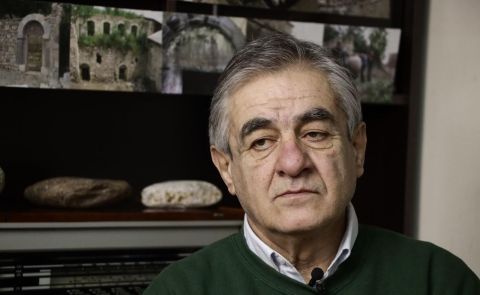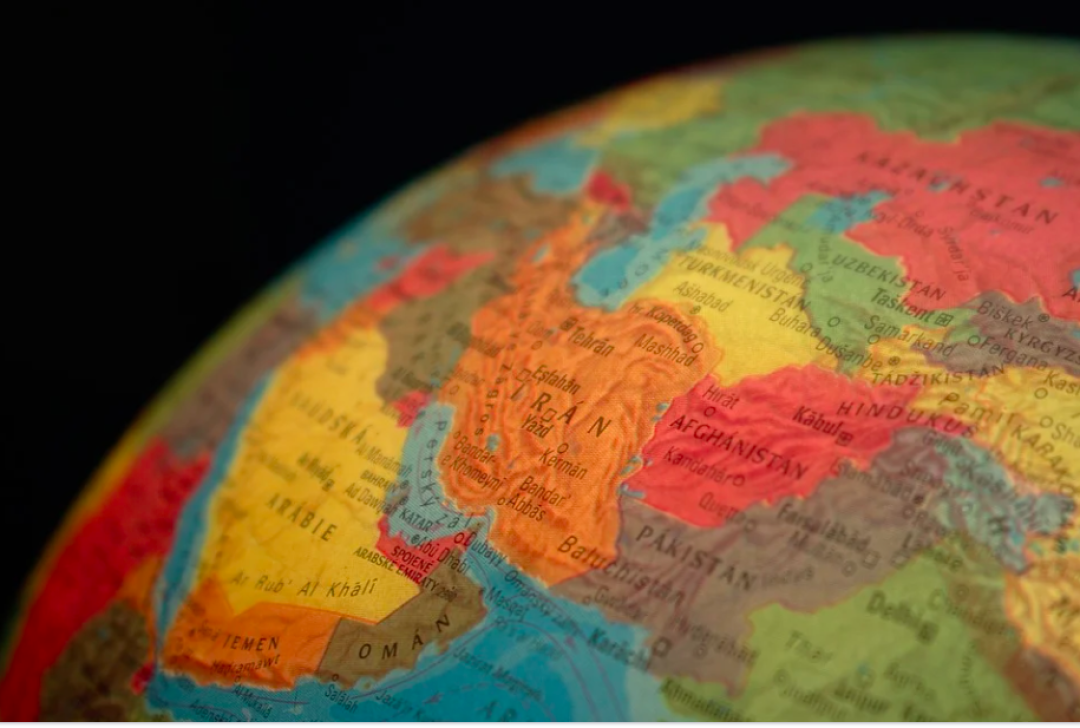
Afshar Soleimani: Russia Is Supportive of the Zangezur Corridor

Afshar Soleimani, the former Iranian ambassador to Azerbaijan from 2005 to 2008, presided over relations between the two majority-Shia states in the region at a more favorable time while serving in Baku. At least in part, the contentious relationship is a result of the Iranian-Azerbaijan relationship undermining Azerbaijan's strategic partnership with Israel.
Tehran has accused Baku several times of facilitating Israeli action from its territory. The recent Israeli attack on Iran's Embassy in Syria on April 1 raised the question of whether the perceived Israeli presence in Azerbaijan may now be seen as a legitimate target for Iran’s response. In order to find out the possibility of that proposition, Caucasus Watch initiated talks with Ambassador Soleimani.
Is Iran likely to target perceived Israeli bases in Azerbaijan in response to the Israeli attack in Syria?
Speculation emerged within certain fringe parliamentary circles, specifically by Rashid Kochi, MP, who was not recently re-elected. There has been no official statement from authorities in Azerbaijan or Iran regarding this matter. In my opinion, this is not a tangible concern, and I do not think anything of the sort is probable. Iran may target Israel's interests in non-neighbouring states, likely through proxy forces. But not in the Caucasus.
It is important to highlight that conducting a direct military strike by Iran would be a grave error. Certain Israeli media outlets, along with extremist factions within Iran and even some Russian analysts, have been promoting the idea of an Iranian attack on Israel. Their objective seems to push Iran into an undesired conflict, akin to the situation in Ukraine.
Iran has welcomed the EU’s monitoring mission in South Armenia. Russia has 4,000 FSB border guards stationed over the same region. At the same time, with military exercises along the border, Iran has delineated a red line regarding Armenian sovereignty in Syunik and established a consulate in Kapan. Do you find the region slightly “crowded”? Do you see Iran seeking its own monitoring or peacekeeping role in the near future?
It is inaccurate to claim that Tehran consents to the presence of European observers in the territory of Armenia. While the territorial integrity of nations is their own concern, it is not in line with Iran's position to endorse the EU's presence. The Islamic Republic's longstanding position has been that regional issues should be resolved through the involvement of neighbouring countries, without interference from external actors or organizations. In this context, the idea of a 3+3 framework has been proposed, which I have supported during my tenure at the Ministry of Foreign Affairs. As negotiations continue and efforts are made towards achieving peace, the 3+3 model could potentially serve as a framework for security and economic cooperation between Iran, Russia, and Turkey. In practice, this proposition faces significant challenges due to complex regional dynamics.
Georgia has not yet participated. Tbilisi has made it clear that it will not engage until its issues with Russia are resolved. Even if unofficial dealings were reported, the two countries still grapple with complex matters stemming from the 2008 war.
In the ongoing discussion surrounding the presence of Russian security forces on the Armenian border, this issue has persisted for some time. Russia expresses its desire to maintain its presence. Armenia seems to be taking a cautious approach. The Speaker of the Armenian Parliament called for the Russian forces to withdraw from the Zvartnots airport in Yerevan.
It is important to highlight that the two countries have a military treaty dating back 49 years, and Russia maintains a military base in Gyumri. Despite the return of Karabakh to Azerbaijan, Russian forces remain in the region, potentially poised to play a new role. The ongoing debate surrounding the Zangezur Corridor, with Armenia opposing the presence of Russian forces, is a new position. In contrast, Azerbaijan does not oppose the presence of Russian forces and welcomes their monitoring of a corridor between Azerbaijan and Nakhichevan. This situation is likely to persist.
Armenian Prime Minister Pashinyan has expressed reservations about the Collective Security Treaty and has chosen not to participate in summits. Recently, Armenia even suspended its membership of CSTO. While Russia expresses discontent over Armenia's divergence, its involvement in the Ukrainian conflict limits its ability to react resolutely. The Armenian government has accused the Kremlin of attempting a coup through its military agents, further straining relations. These tensions are expected to continue.
Armenia has invited the European Union's civilian observer forces to monitor border movements with Azerbaijan. Azerbaijan has opposed the presence of European agents within its borders and has only consented to their monitoring of the border through Armenia. Armenia's actions in this regard can be seen as a form of confrontation with Russia. Armenia has also increased military cooperation with India and France. The question arises as to how Armenia can continue its military cooperation with Western countries and Iran simultaneously.
While some speculate about Iran's influence in Armenia, such as opening a consulate general in Kapan, the possibility of Iranian troops or a base being established there, it is unlikely that Armenia would take such steps. Cooperation with the West will complicate matters. Ultimately, Armenia will have to make a choice, and it appears to be leaning towards a Western-oriented path.
This elicits reactions from Russia. A few weeks ago, the route to Russia through Abkhazia was closed to Armenian trucks, closing access from the Georgian border. It is important to note that Armenia's energy supply, including the gas provided by Iran, relies on Gazprom-owned pipelines. These developments add further complexity to the situation.
Over the last three years, there have been large-scale military drills on both sides of the Aras River. What do you think Iranian drills communicate: to Azerbaijan, to Armenia, and to Russia?
Iran carried out maneuvers after Azerbaijan consolidated control over Karabakh. Iran strongly opposes the geopolitical change, including the Zangezur Corridor, which will lead to geopolitical change and the loss of the border. These maneuvers convey this message. It is interesting that Armenia has not taken a position mirroring Iran. They are more focused on the position that if Armenia agrees to the corridor, it should be under the sovereignty of Armenia. This means that Armenia can set up a border guard and customs post on its own territory, and there are no third-party forces (meaning Russia). In the meantime, Mr. Pashinyan has also proposed the Peace Crossroads so that communication can be established from other regions.
Azerbaijan is actively developing road and rail infrastructure within its territory, with the support of Turkey. Russia has not explicitly taken a stance on the matter and has not aligned itself with Iran. However, there have been hints from Russian officials suggesting their support for the Zangezur Corridor. The Russian Ambassador to Azerbaijan referred to this sotto voce. Russia's Foreign Ministry spokesperson, Maria Zakharova, stated that the issue lies with Armenia.
This corridor holds economic significance for Russia, particularly in terms of energy and transportation, enabling Russia to reach Turkey through Azerbaijan and Nakhichevan, which aligns with Turkey's ambitions of becoming an energy hub. In the regional context, Russia's positions differ from those of Iran. While recent circumstances have led to a partial level of cooperation between the two, Russia is opposed more than the United States to Iran playing a resolute role. Regrettably, Iran's foreign policy appears to lack balance and leans towards a one-sided approach.
You indicated that the Russians have subtly signalled approval for the Zangezur Corridor. Does Russia truly benefit from the Zangezur Corridor, facilitating Turkey’s enhanced access to the Caucasus?
The potential alignment of Russian interests towards the Zangezur Corridor hinges on regional developments in the war in Ukraine. In the event of a protracted conflict in Ukraine, thus impeding access from the north, Russia may increasingly view the Zangezur Corridor as strategically appealing. Notably, amid energy discourse, Russia aims to bolster collaboration with Turkey, positioning the latter as a pivotal energy gateway. This bid for energy cooperation signifies Turkey’s inclination towards diversifying partnerships beyond NATO. Amidst sanctions and challenges to Russian energy infrastructure in the Black Sea, energy collaboration with Turkey assumes heightened significance, underscoring a potential pivot towards the Zangezur Corridor for energy and goods transit.
Iran hopes to regain direct railway access to Russia via Azerbaijan. Are we any closer to determining a date for the connection of the Jolfa-Nakhichevan or the Astara-Rasht railway lines than we were a year ago?
Iranian shipments are transported to Russia via the port of Astrakhan, using the ports of Amirabad and Anzali in the Caspian region. The primary route for Iranian trucks still goes through Azerbaijan, as it is not feasible to travel through Armenia. Armenia does not share a border with Russia, and the distance is substantial. Moreover, Armenia lacks well-developed roads and would require significant investment to improve its infrastructure. Claims that transportation occurs through Armenia are more of a slogan than a reality. Even when it comes to reaching Georgia, the preferred route is often through Azerbaijan, which offers both railway and road connections. Azerbaijani goods bound to the Gulf, in turn, transit via Iranian territory.
Iran initiated the North-South Corridor project with the involvement of India and Russia. I have personally attended summits related to this initiative in Delhi and St. Petersburg since its inception. Unfortunately, so far, the progress on the Rasht-Astara railway has been halted. It is incorrect to wait for another country to invest in the project; Iran should take the lead. The Black Sea-Persian Gulf route is also inactive and should be put back on track.
What is your understanding of the difference between the Crossroads of Peace, as described by the Armenian government, and the Zangezur Corridor, as described by the Azerbaijani government?
The peace crossroads vision lacks detail. The railway infrastructure along the mentioned axis is weak, with the Gajran tunnel requiring significant work. These developments take time, unless they are hollow slogans. In all of these endeavours, Iran has the potential to play a significant role in the eastern, western, northern, and southern corridors, provided it establishes a balanced foreign policy. Unfortunately, a series of opportunities in the energy sector have been lost. Iran had the potential to become an energy transit hub, but that slipped away.
Regarding the Zangezur Corridor, I have raised this issue multiple times. If Armenia were to accept the corridor, how would Iran react? In my opinion, the current Armenian government is pursuing a peace agreement and seeking to normalize relations with Turkey. In such a scenario, while implicitly gaining support from the West, Armenia's reliance on Iran might decrease.
To what extent is the Aras Corridor an antagonistic vision of Azerbaijan’s Zangezur Corridor?
The Aras Corridor is more complementary than an alternative. Azerbaijan's priority is Zangezur, which requires Armenian consent, Russian support, Western and Iranian acceptance. Accepting Armenian sovereignty means customs and border checkpoints at the entry points to Armenia. Azerbaijan rejects this notion, as they want uninterrupted communication. The Aras Corridor is six kilometers shorter than Zangezur but is moving slowly.
Speculation about a potential military attack by Azerbaijan on Syunik lacks logical reasoning but creates a certain atmosphere. Armenia is now a destination for defense ministers that are not Baku’s closest allies: France, Greece, and Cyprus. Interestingly, the French ambassador in Armenia recently remarked that despite having numerous conflicts with Iran, they hold common ground on Zangezur. These intricacies significantly impact the peace process and further complicate the overall situation.
Interview conducted by Ilya Roubanis
See Also


Irina Mamulashvili: Electoral Interference is a Playbook, not a Recipe

Giorgi Gakharia: The EU Should Engage Georgia Despite Its Democratic Backsliding

Peace or Capitulation? Shahverdyan on Armenia-Azerbaijan Agreement and the Nagorno-Karabakh Crisis

Ali Mousavi Khalkhali: Iran Will Avoid Conflict in the Caucasus

